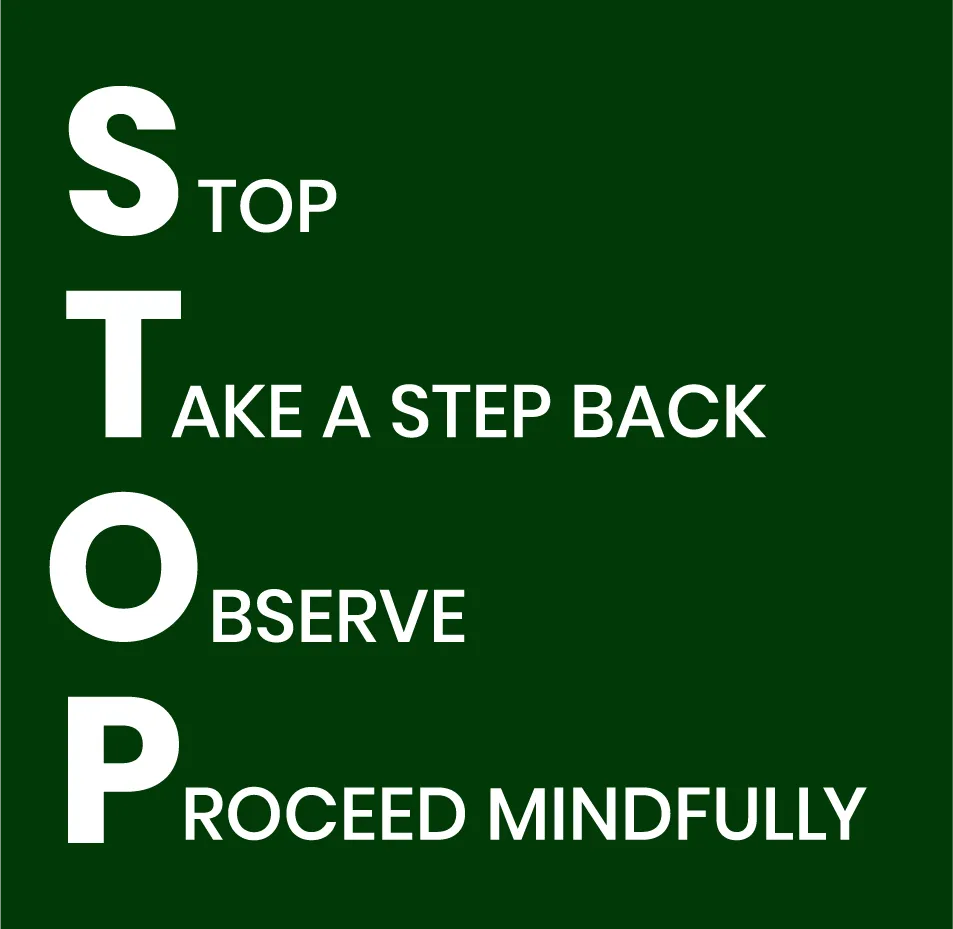Introduction
Emotion Regulation is a crucial aspect of Dialectical Behaviour Therapy (DBT), equipping individuals with essential skills to effectively manage and navigate their emotions. In this comprehensive article, we will delve into each Emotion Regulation DBT skill, providing a detailed overview of the strategies that empower individuals to regulate their emotions in a healthy and effective way.
Table of Contents
1. DBT STOP Skill
Understanding the DBT STOP Skill
The DBT STOP Skill is a foundational tool that encourages individuals to pause and gain control during moments of intense emotions. STOP stands for Stop, Take a step back, Observe, and Proceed mindfully. This skill offers a structured approach to interrupt emotional escalation and promotes self-awareness.

Exploring each component of the STOP Skill provides insight into its effectiveness. “Stop” involves recognising the need to pause, “Take a step back” encourages distancing from the emotional situation, “Observe” prompts mindful awareness of thoughts and feelings, and “Proceed mindfully” guides individuals in making intentional choices.
2. Opposite Action
Implementing Opposite Action
Opposite Action is a powerful technique that encourages individuals to act in a way that contradicts their emotional impulses. By intentionally choosing behaviours opposite to the emotional urge, individuals can disrupt negative emotional patterns. For example, if the impulse is to withdraw when feeling sad, opposite action may involve reaching out to others for support.
Understanding the emotions associated with specific situations is crucial for the effective use of Opposite Action. This skill emphasises the importance of consciously choosing behaviours that align with the desired emotional outcome.
3. ABC Please
The ABCs of Emotion Regulation
ABC Please is a mnemonic that encapsulates three key components of effective emotion regulation: Accumulate Positive Emotions, Build Mastery, and Cope Ahead.
PLEASE
PLEASE stands for Treat Physical illness, balanced Eating, avoid mood-Altering substances, balance Sleep, and Exercise. This component highlights the crucial connection between physical well-being and emotional regulation.
- Treat Physical Illness: Addressing physical health is essential for emotional well-being. Seeking medical attention for illnesses and ensuring proper self-care can have a positive impact on overall mood.
- Balance Eating: Maintaining a balanced and nutritious diet is integral to emotional regulation. Stable blood sugar levels contribute to a more stable emotional state.
- Avoid mood-Altering Substances: Limiting or avoiding substances that can alter mood, such as drugs or excessive alcohol, is crucial for maintaining emotional stability.
- Balance Sleep: Quality sleep is fundamental to emotional health. Establishing consistent sleep patterns contributes to improved mood and cognitive function.
- Get Exercise: Regular physical activity has a profound impact on emotional well-being. Exercise releases endorphins, which are natural mood lifters, promoting a positive emotional state.
Thinking about starting DBT? Learn more about our online DBT courses here.
4. Accumulating Positive Emotions
Fostering Joy and Well-Being
Accumulating Positive Emotions is a fundamental aspect of Emotion Regulation in DBT. This skill encourages individuals to actively seek and engage in activities that bring joy, satisfaction, and a profound sense of well-being. By consciously incorporating positive experiences into daily life, individuals create a reservoir of uplifting emotions that can act as a buffer during challenging times.

The process involves identifying activities that personally resonate with an individual’s sense of happiness. It could be as simple as spending time in nature, connecting with loved ones, pursuing hobbies, or practicing mindfulness. By prioritising these positive experiences, individuals not only enhance their emotional well-being but also build resilience to navigate life’s inevitable emotional challenges.
5. Build Mastery
Cultivating a Sense of Mastery
Build Mastery emphasises the importance of engaging in activities that foster a sense of accomplishment and competence. This skill recognises that mastery over tasks and challenges contributes significantly to enhanced self-esteem and resilience in the face of emotional difficulties.

Individuals are encouraged to identify areas in which they can build mastery, whether it’s learning a new skill, completing a challenging task, or achieving personal goals. By actively pursuing and achieving mastery, individuals enhance their overall emotional well-being.
6. Cope Ahead
Planning for Emotional Challenges
Cope Ahead is a proactive strategy that involves preparing for anticipated situations that may trigger intense emotions. This skill encourages individuals to identify potential challenges, anticipate their emotional responses, and develop effective coping strategies in advance.
The process of Cope Ahead includes visualisation and mental rehearsal, allowing individuals to mentally prepare for emotional situations. By planning ahead, individuals can approach challenges with greater confidence and resilience, minimising the impact of intense emotions.
7. Positive Self-Talk
Harnessing the Power of Positivity
Positive Self-Talk is a transformative skill that focuses on cultivating a positive inner dialogue. Or as we like to put it “be your own cheerleader”. This involves challenging negative thoughts and replacing them with affirming and constructive statements. By consciously choosing positive self-talk, individuals can shift their perspective, enhance self-esteem, and promote emotional well-being.
The practice of Positive Self-Talk is rooted in mindfulness, encouraging individuals to be aware of their thoughts and actively choose positive, encouraging language. This skill serves as a powerful tool for reframing negative thought patterns and fostering a more positive and resilient mindset.
Thinking about starting DBT? Learn more about our online DBT courses here.
Conclusion
In conclusion, Emotion Regulation DBT Skills offer a robust toolkit for individuals seeking to enhance their emotional well-being. From the structured approach of the DBT STOP Skill to the transformative power of Positive Self-Talk, each skill contributes uniquely to the overarching goal of emotion regulation.
By incorporating these skills into daily life, individuals can cultivate greater emotional balance and resilience. Embracing the principles of Dialectical Behaviour Therapy empowers individuals to navigate life’s emotional challenges with confidence and self-assurance.
Remember, consistent practice and application of these skills are key to mastering the art of Emotion Regulation in DBT.




